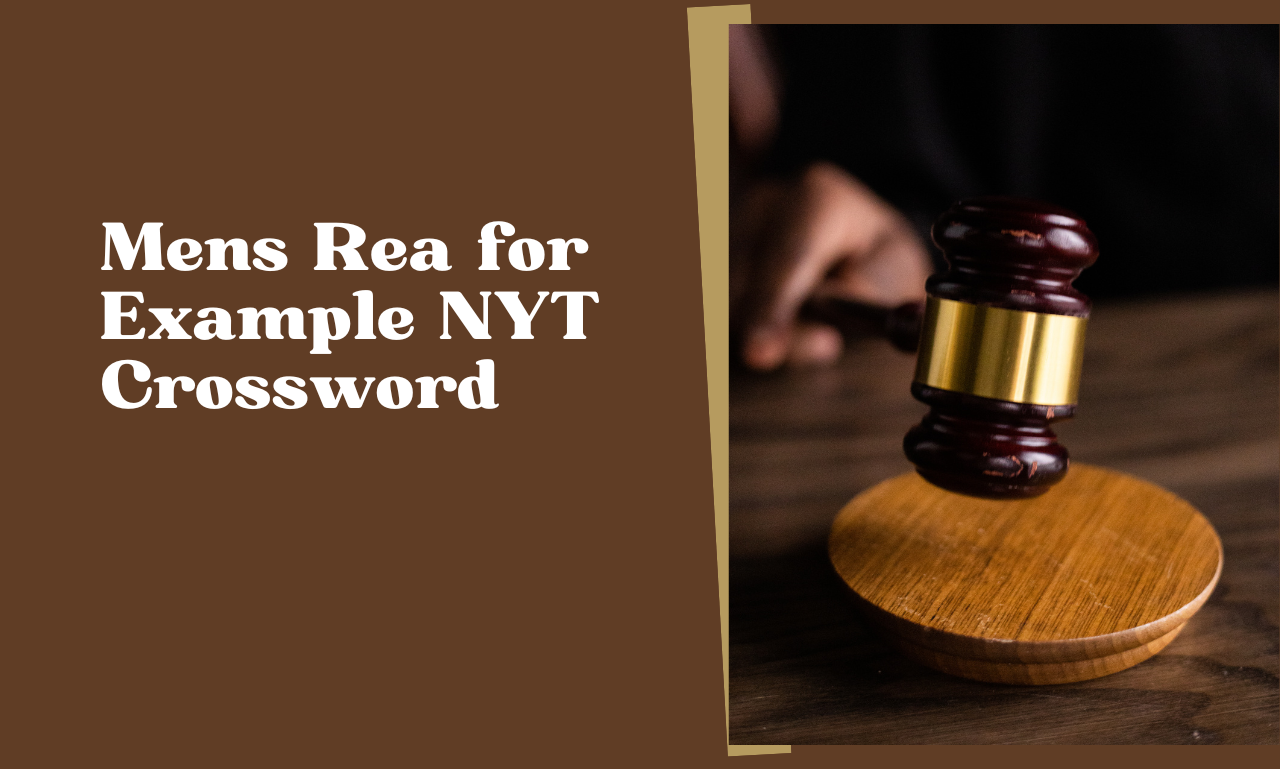The New York Times (NYT) crossword puzzles are known for their clever and challenging clues, often drawing from various fields such as law, literature, science, and popular culture. One such clue that may appear in these puzzles is “Mens rea for example NYT crossword.” The answer to this clue is “INTENT.” In this article, we’ll explore the meaning of “mens rea,” its significance in legal contexts, and why “INTENT” is a fitting answer for this crossword clue.
Understanding Mens Rea
What is Mens Rea?
“Mens rea” is a Latin term that translates to “guilty mind.” It is a fundamental concept in criminal law that refers to the mental state or intent of a person at the time they commit a crime. In order to establish criminal liability, it is often necessary to prove that the defendant not only committed the wrongful act (actus reus) but also had the requisite mens rea or criminal intent.
The Role of Mens Rea in Criminal Law
Mens rea plays a crucial role in determining a person’s culpability for a crime. It distinguishes between different levels of guilt based on the individual’s state of mind. For example, a person who commits a crime with premeditated intent may be charged more severely than someone who acted out of negligence or recklessness.
Mens rea can have several forms, including:
- Intent: The deliberate and conscious decision to commit a specific act with the knowledge that it is wrong.
- Knowledge: Awareness that one’s actions will likely result in a particular consequence.
- Recklessness: Disregard for the known risks associated with one’s actions.
- Negligence: Inability to use appropriate caution to prevent injury.
Understanding these different levels of mens rea helps legal professionals determine the appropriate charges and penalties for a defendant.
Why “Intent” is the Answer to Mens Rea for Example NYT Crossword
The Connection Between Mens Rea and Intent
In crossword puzzles, clues often rely on the solver’s ability to make connections between concepts. The clue “Mens rea for example NYT crossword” asks solvers to identify a specific type of mens rea. The correct answer, “INTENT,” directly refers to one of the most significant forms of mens rea in criminal law.
Intent is the mental determination to perform a particular act with the purpose of achieving a specific outcome. It is a deliberate and conscious decision, making it a key element in many criminal cases. In this context, intent reflects a higher level of culpability compared to other forms of mens rea like negligence or recklessness.
How “Intent” Fits the Crossword Clue
The crossword clue “Mens rea, for example” is a straightforward prompt for solvers to identify a type of mens rea. Among the various forms of mens rea, “INTENT” is a fitting answer because it encapsulates the idea of a purposeful and deliberate state of mind. This aligns with the general understanding of mens rea as a concept in criminal law.
The answer “INTENT” also fits neatly within the common structure of crossword puzzles, where the clue and the answer are often related through a shared meaning or theme. In this case, the theme is legal terminology, and “INTENT” perfectly matches the clue provided.
The Importance of Intent in Legal Proceedings
Intent and Criminal Liability
Intent is a critical factor in determining criminal liability. For a person to be convicted of a crime, the prosecution must typically prove that the defendant had the intent to commit the crime. This is especially true in cases involving serious offenses such as murder, where the intent to kill or cause serious harm is a key element of the crime.
In some legal systems, different types of intent can lead to varying degrees of criminal charges. For example, first-degree murder usually requires proof of premeditated intent, while second-degree murder may involve intent without premeditation.
Intent in Civil Law
While mens rea is primarily a concept in criminal law, intent can also play a role in civil cases. In tort law, for example, intent is relevant when determining liability for intentional torts, such as assault or defamation. In these cases, the plaintiff must demonstrate that the defendant acted with the intent to cause harm.
The presence or absence of intent can significantly affect the outcome of both criminal and civil cases. It influences the severity of charges, the potential defenses available to the defendant, and the penalties imposed by the court.
Conclusion
The clue “Mens rea for example NYT crossword” is a classic example of how legal concepts are used to challenge solvers. The answer “INTENT” reflects a core aspect of mens rea, which is the mental state or intent behind a criminal act. Understanding the significance of intent in legal contexts helps to clarify why it is the appropriate answer for this crossword clue.
In the world of crossword puzzles, clues like “Mens rea, for example” provide an opportunity to engage with complex ideas in a concise and accessible way. By solving such clues, enthusiasts not only test their knowledge but also gain a deeper appreciation for the intricacies of language and law. Whether you’re a legal expert or a casual solver, the connection between “mens rea” and “INTENT” offers a fascinating glimpse into the intersection of criminal law and wordplay.

